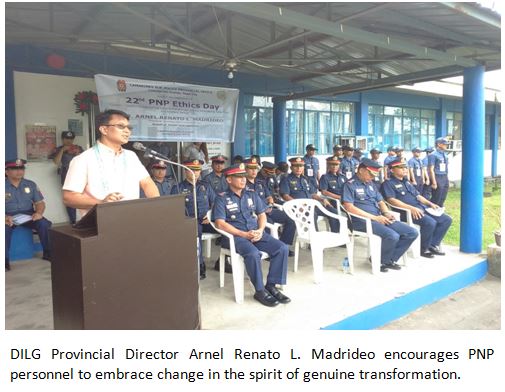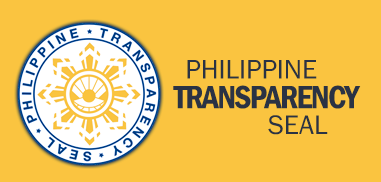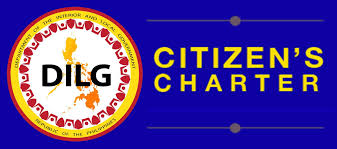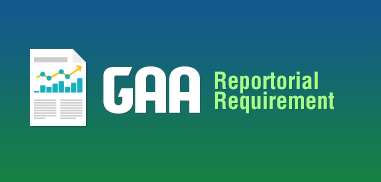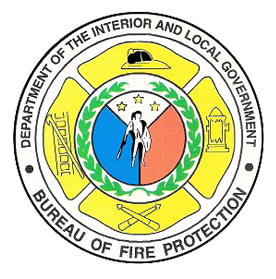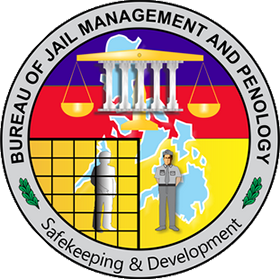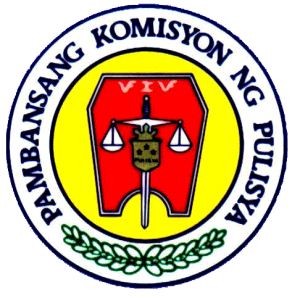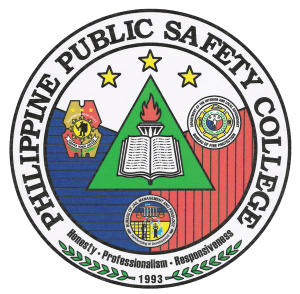The Camarines Sur Police Provincial Office (CSPPO) headed by PSSupt. Walfredo G. Pornillosinvited DILG ProvincialDirector Arnel Renato L. Madrideoto talk on the theme “PNP’s Commitment to Genuine Transformation: A Key to Achieving Public Trust and Excellent Service” during the 22nd Philippine National Police (PNP) Ethics Day Celebration on January 11, 2016 at CSPPO Parade Ground, Concepcion Grande, Naga City.
The celebrationwas conducted as a reinforcing activity to institutionalize the practice of the values embodied in the PNP Code of Professional Conduct and Ethical Standards which contains all the moral values which should be observed in order for policemen to be disciplined, professional and morally upright.
Following is the full text of PD Madrideo’s speech during the activity. (LGOO V Kathlyn B. Lopez)
Message delivered by PD Arnel R.L. Madrideo on 11 January 2016 at the CSPPO Parade Ground on the occasion of the Flag Raising Ceremony and 22nd PNP Ethics Day Celebration with the theme , “PNP’s commitment to Genuine Transformation: A Key To Achieving Public Trust and Excellent Service.
I am much honored to be a part of this 22nd PNP Ethics Day Celebration. I am most thankful to the CSPPO Provincial Director, Police Senior Superintendent Walfredo G. Pornillos for the invitation.
PD Wally and I were together in a number of significant trainings and conferences. And, in those gatherings, I must say that I learned from his concise, straight-forward and insightful comments which are instructive. These are actually the considerations that I took in organizing this brief talk with you all today.
I would like to assume that this is part of the many reinforcing activities that support any transformation program that this organization – the PNP has or might have. My message to you is built on the words commitment, transformation, trust and service that you mentioned in today’s theme, “PNP’s Commitment to Genuine Transformation: A key to Achieving Public Trust and Excellent Service”.
These key words become more interesting because to you transformation has to be genuine and that service must be excellent. This I think is very appropriate because we deal not just with anybody’s trust but, public trust. And, all these things can spring out of the individual and collective commitment of the PNP. I can only surmise that you have given so much thought in deciding today’s theme.
Allow me to say that I fully agree when you said that your commitment to genuine transformation is a key to achieve public trust and excellent service. I will also not stop in saying that in all these, the larger community must also do its share to ensure that this goal is realized. Engaging participation from the larger community however, may not be as easy as one would think. This however, should start somewhere — drawing some inspiration from an individual person or the organization. Finding an inspiration from the organization is not very difficult for all of us because we only need to go back to our organizational VISION and MANDATE. I know that we can never go wrong if we have a clear understanding of the reasons for our existence and a clear view of our direction. We do not also need to depend to somebody we consider great in achievement because, to paraphrase what former DILG Secretary Jesse Robredo stated, we can always find the hero within us.
Transformation or genuine transformation, as you call it, requires bigger change. This would not happen overnight. And, supposedly, this change could have been very easily regarded as a fact of organizational life if our understanding of our vision and mandate is clear. But, this is not so as our experience would tell us. This is most probably because sometimes our understanding is muddled by our own self-interests. We have different perspectives to a situation and when a proposed change is not communicated well enough, resistance is most likely to occur. This is the reason why changes or innovations being implemented would take longer period of time or, worst, it does not happen at all. In a bureaucratic environment, opposition to change is particularly serious since it normally takes place before an idea has made it out in the public arena. The bureaucracy‘s weapons to stifle change are truly intimidating. The first line of defense is usually delay and obfuscation. For instance, memos get lost; demands for information get sidetracked. At times, bureaucrats may also tend to use crises to block initiatives for change.
I would submit therefore, that commitment to a genuine transformation should mean personal conversion. Only when an individual believes in his cause and the cause of the organization can we expect change to happen, otherwise, commitment becomes mere lip service. Here is where our other difficult situation in going through the process of transformation occur because not everyone would be convinced readily. Some would welcome the idea for change but, for others it will take some time. To those who are convinced, how long can they sustain the effort in the midst of strong opposition to the proposed changes? Accordingly, for all those who oppose because they just cannot leave their comfort zones, how do we convince them to toe the line for them to see the benefits that the expected change would offer?
I would like to share to you this story that I took from the book, Everyday a Friday by Joel Osteen. The story is instructive of how we think and cling to our ideas that sometime we do not see the whole picture of things. My idea is that for those advocating change would strengthen their resolve to their cause while those unduly resisting change to take place would draw some lessons from it. Here is the story:
A couple moved into a new neighborhood, and one morning while they were eating breakfast, the wife looked out of the window and saw her neighbor hanging wash on the line to dry. She noticed the wash was dingy and dirty. She said to her husband, “That neighbor lady does not know how to wash. Her clothes aren’t clean. I wonder if she’s even using detergent”.
Day after day went by and she would make the same comments. A few weeks later the woman looked again at the window and was surprised to see that the clothes were as clean and as bright as can be. She called her husband and said, “I can’t believe it, she finally knew how to wash. I wonder what happened.”
The husband smiled and said, “Honey, I got up early this morning and cleaned our windows.”
How dirty your neighbor’s clothes appear depends on how clean your window is. The scripture says, “To the pure, all things are pure.” If you can’t see anything in a positive light, if you drive up and down the freeway and see only potholes, if you only see the scratch in the floor and never the amazing house, if you see only what your boss does wrong and never what he does right, then the advice might be to clean your own window.
The problem is not with everyone else; instead you have an internal problem. It’s like the man who had an accident driving to work. He got out and said, Lady, why don’t you learn how to drive? You’re the fourth person who has hit me today?
At some point, look at the mirror and say, maybe I’m the one who needs to change. If I’m always critical, maybe I’ve developed the habit of seeing the bad rather than seeing the good. If I’m always skeptical, maybe I’ve trained myself to be cynical and sarcastic rather than believing the best. If I’m always finding fault, maybe my filter is dirty. Maybe I’ve become judgmental and condemning instead of giving people the benefit of the doubt”.
The above story is inspired by a verse in the Old Testament, in Titus 1:15 NIV, “to the pure, all things are pure but, to those who are corrupted and do not believe, nothing is pure. In fact, both their minds and conscience are corrupted”. In our crusade for genuine transformation, there will be lots of obstacles, including difficult people. And, we can only succeed by understanding the reasons for the opposition/complaint; by clearly communicating to them why the need for change— going on slow on criticisms that destroys rather than builds trust; and of course lots of patience and persistence, lest we get tired and become complacent and contented with the status quo.
Having said all these, I can only look towards the time when more and more of us will be embracing change in the spirit of genuine transformation. The process, long as it may seem, should lead to a credible, highly effective and capable organization where community partnership can thrive. We all owe it to the public that we serve. Our job is imbued with public trust and we owe to our people the excellent service they rightfully deserve. This may prove to be a tall task for all of us but, surely it is never impossible. We shall mark this day with our continued effort for genuine transformation because as you aptly said it, this is the key to achieve the public trust and excellent service.
A great day ahead for all of us. Good morning and Thank you.

